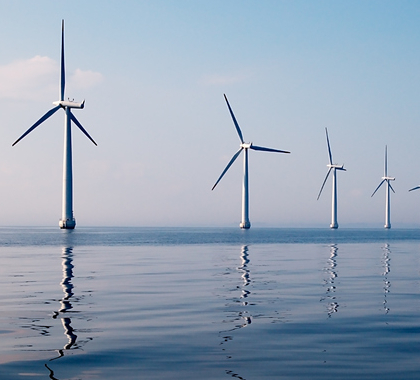The Cape Wind project, a massive array of wind turbines planned for construction off the Massachusetts coast, has been terminated after years of battling against local opposition and fighting multiple court challenges.
Cape Wind was the first offshore wind farm to be proposed in the United States, having applied for a federal permit in 2001. As initially planned, the project was to construct 130 wind turbines in federal government waters between four and 11 miles off the Massachusetts coast. At peak capacity, the turbines would have generated 454 megawatts of electricity.
Despite having a power purchase agreement in place, receiving more than $150 million in loan guarantees from the U.S. Energy Department, having every state and local pre-construction permit in hand by 2009, and receiving its final federal approval to begin construction in April 2011, Cape Wind was never able to overcome local opposition from a variety of homeowner groups, towns, and Native American tribes who repeatedly sued in different jurisdictions to block the project.
Over time, the continual delays caused by the lawsuits cost Energy Management Inc., the developer, several key contracts and financing. Energy Management finally threw in the towel, announcing it was cancelling Cape Wind during the final week of November 2017.
Mounting Opposition
For years, fishermen and businesses reliant on tourism presented legal challenges to Cape Wind. Powerful, politically connected residents along the Nantucket Coast and Cape Cod also fought the proposed wind farm.
Among the latter group, the Kennedy family, who own six acres of waterfront property on Cape Cod, mounted a very public campaign against Cape Wind, with Robert Kennedy Jr. penning a New York Times op-ed in 2005 in which he wrote, “I do believe that some places should be off limits to any sort of industrial development. I wouldn’t build a wind farm in Yosemite National Park. Nor would I build one on Nantucket Sound.”
Kennedy’s uncle, Sen. Ted Kennedy, now deceased, also challenged the Cape Wind project based on environmental and economic problems he said the project posed.
Expensive Power
Tim Benson, a policy analyst with The Heartland Institute, which publishes Environment & Climate News, says the Cape Wind project was defeated largely by people who claim to support wind power.
“Cape Wind went up against the nearly unstoppable force of upper-class liberal NIMBYism and was defeated,” Benson said. “However, in this case it is a good thing upper-class liberal NIMBYism prevailed in the end.
“The country’s first and only offshore wind farm, located off of Rhode Island’s Block Island, cost $300 million for the construction of just five turbines,” said Benson. “These turbines provide power for just 17,000 homes, meaning the wind farm will cost roughly $17,600 per home powered.”
Benson says lower-income Americans bear the financial burden of inefficient wind-power programs.
“The costs of wind-powered electricity generation wouldn’t have been much more economically burdensome to the toffs on Martha’s Vineyard and Nantucket, who certainly can afford the installation of Cape Wind,” Benson said. “However, the high costs of offshore wind, estimated to be between 18 cents per kilowatt hour and more than 20 cents per kilowatt hour, would have been punishing to low-income Bay Staters if and when Cape Wind ever came online.
“Despite these high, regressive costs, the Massachusetts government has a goal of generating 1,600 megawatts of electricity from offshore wind,” Benson said.
Victory for Residents
John Droz, an independent physicist who runs the Alliance for Wise Energy Decisions, has travelled to Massachusetts from his home in North Carolina multiple times to lend support to groups opposing Cape Wind.
“This is a victory for the Save Our Sound organization and other hardworking citizens who are against unscientific, politically favored energy sources being foisted on our communities nationwide,” Droz said. “The absurd ‘All of the Above’ energy motto needs to be changed to ‘All of the Sensible.'”
“In this case, Cape Wind was found to not be sensible. RIP,” said Droz.
Chris Talgo ([email protected]) is a marketing coordinator for The Heartland Institute.





